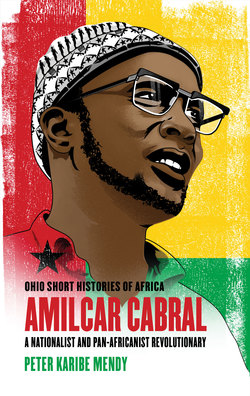Читать книгу Amílcar Cabral - Peter Karibe Mendy - Страница 10
На сайте Литреса книга снята с продажи.
ОглавлениеIntroduction
Amílcar Lopes Cabral was among the iconic political leaders of the twentieth century. A consummate nationalist and Pan-Africanist revolutionary, he masterminded the end of Portuguese rule in Guinea-Bissau and Cabo Verde and was also actively engaged in the anticolonial struggles in Angola, Mozambique, and São Tomé and Príncipe. The protracted armed struggle waged by his liberation movement, the African Party for the Independence of Guinea and Cabo Verde (PAIGC), bestowed upon Guinea-Bissau a central role that defined the course and outcome of the decolonization process in the other Portuguese African colonies.
Cabral was born in Guinea-Bissau in 1924 of parents from the island of Santiago in Cabo Verde. The ten-island archipelago was reached and settled by the Portuguese in the fifteenth century. The slave plantation society that was established there was the prototype of what the Americas would later become. When slavery was abolished in 1869 it was replaced by an equally exploitative system that included the use of poor Cabo Verdean contratados (indentured laborers) in the cacao plantations of São Tomé and Príncipe. On the other hand, as the main beneficiary of Portugal’s educational enterprise in Africa, with a seminary opened on the island of São Nicolau in 1866, Cabo Verde had the lowest illiteracy rate in Portuguese Africa: in 1959, it was 78 percent, compared to 97 percent in Angola, 98 percent in Mozambique, and 99 percent in Portuguese Guinea. The much higher literacy rate in the archipelago largely accounted for the predominance of Cabo Verdeans in the colonial administration of Portuguese Guinea, Cabral’s terra natal (land of birth), from where, at age eight, he moved to his terra ancestral (ancestral land).
In 1945, following the completion of his high school education in Cabo Verde, Cabral left for Portugal and enrolled as an agronomy student at the Technical University of Lisbon, where he graduated in 1950. While in Lisbon he actively engaged in clandestine antistate politics together with other radicalized African students, including Agostinho Neto and Mário Pinto de Andrade from Angola, and Marcelino dos Santos from Mozambique.
Cabral returned to Portuguese Guinea in 1952 to work as an agronomist. For two years he traveled extensively in the colony to conduct its first agricultural census. This gave him the opportunity to learn about the colonial realities experienced by the colonized. His seminal study on land use, crop cultivation, and, among other things, soil conditions, remains a work of reference. But perhaps more important for Cabral was the acquisition of strategic knowledge about the level of discontent among his compatriots, and the likely responses to an anticolonial mobilization drive for independence.
As the leader of the PAIGC he cofounded in 1956, Cabral became a key player in the political, military, and diplomatic battles that had to be won in order to guarantee victory for the armed struggle that was launched in January 1963, following unsuccessful attempts at peaceful decolonization. His true genius was his ability to mobilize and inspire his fellow compatriots to take life-threatening risks. He was also adept at persuading skeptical international opinion of the righteousness of the armed struggle in the context of an intensifying Cold War, and thus able to secure vital political support and material resources without ties and compromises.
A committed Pan-Africanist, Cabral also played a significant role in the establishment of two of the most effective liberation movements in Angola and Mozambique, respectively the Popular Movement for the Liberation of Angola (MPLA) and the Liberation Front of Mozambique (FRELIMO). He was also a cofounder and the spokesperson of the three successive coalitions of liberation movements in Portuguese Africa, namely the Anticolonialist Movement (MAC), the African Revolutionary Front for the National Independence of the Portuguese Colonies (FRAIN), and the Conference of the Nationalist Organizations of the Portuguese Colonies (CONCP).
Cabral consistently expressed his commitment to and solidarity with “every just cause” in the world, from the Vietnam conflict to the Congo crisis, from the civil rights struggles in the United States to the Palestinian movement for statehood. At the same time, he wrote a number of brilliant works on liberation theory and practice, culture, African history, and class formation, for which he received international acclaim and many awards and honors, including honorary doctorates from Lincoln University in the United States and the Soviet Academy of Science in the then Union of Soviet Socialist Republics (USSR).
Notwithstanding his assassination, Cabral’s liberation movement was able to proclaim the independence of Guinea-Bissau, on 24 September 1973, which was quickly recognized by over eighty countries around the world. The military and diplomatic victory of the PAIGC contributed significantly to the downfall of the forty-eight-year-old fascist dictatorship in Portugal called the Estado Novo (New State) and the rapid dismantlement of the Portuguese empire in Africa. When viewed against the background of a raging Cold War and the stubbornness of a well-armed NATO member nation bent on maintaining its “overseas provinces” at all costs, Cabral’s achievements are indeed remarkable. His ideas, effective charismatic leadership, and achievements are memorialized in many countries in Africa and beyond.
This book aims to demonstrate the importance of leadership by focusing on the political and intellectual challenges and accomplishments of one of Africa’s most effective leaders of the twentieth century. Cabral’s importance lies in the fact that (i) he competently organized and led one of Africa’s most consequential armed liberation struggles, (ii) he skillfully mobilized more than a dozen ethnic groups into a united binationalist cause, (iii) he ably led a successful united front against Portuguese colonialism in Africa, and (iv) he wrote incisive essays and innovative books that still resonate today.
